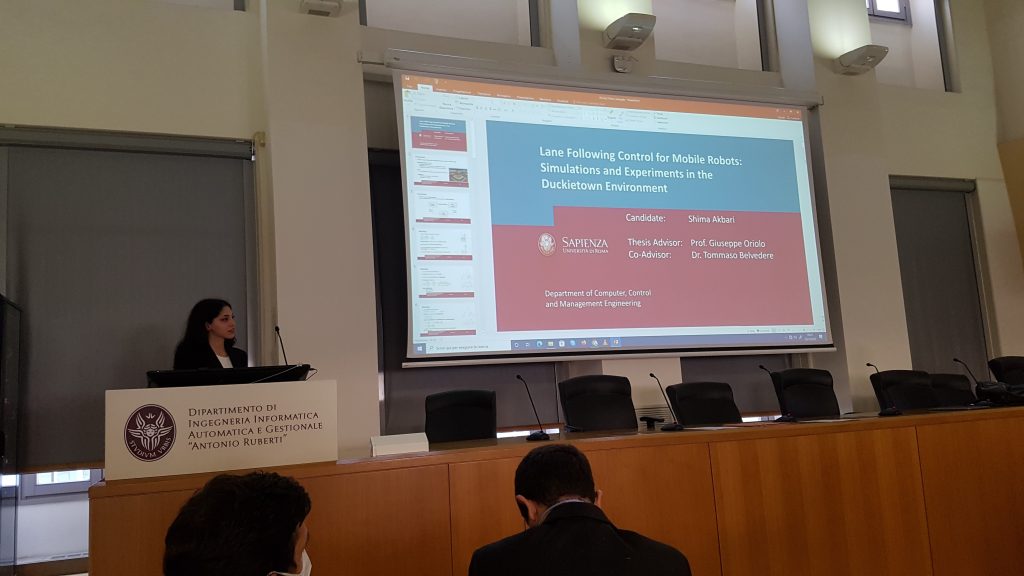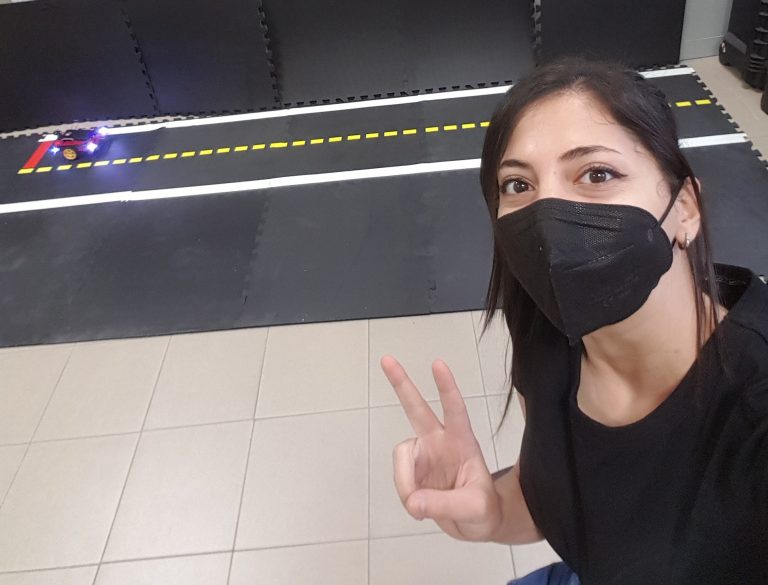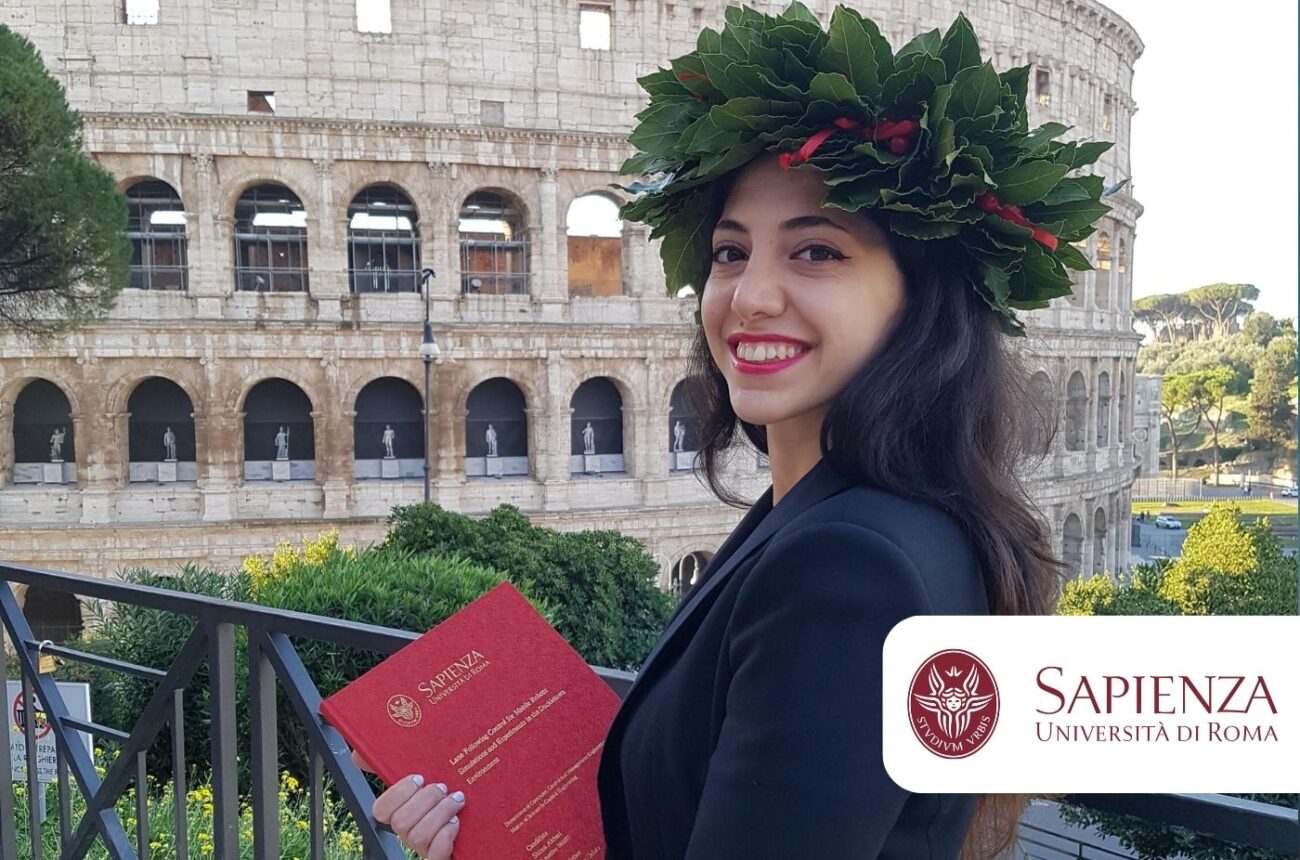“La Sapienza” University of Rome, April 28, 2023: Shima Akbari, a Ph.D. student at the Italian National Program in Autonomous Systems, shares her experience working with Duckietown for her master’s thesis on lane following control for mobile robots.
Shima's work on control strategies for lane following
Hi, thank you for joining us today. Could you introduce yourself?
Certainly. My name is Shima Akbari, and I have a degree in Control Engineering from “La Sapienza” University of Rome. Currently, I am a Ph.D. student in the Italian National Program in Autonomous Systems.
You recently obtained your master’s degree, congratulations! You worked on lane following control approaches for mobile robots using Duckietown. How did you discover Duckietown?
I first learned about Duckietown while working on my master’s thesis. I have always been passionate about control and autonomy, particularly in mobile robots. However, I didn’t want to limit my project to theoretical calculations or computer simulations. I wanted to have a practical component to my work. When I shared this with my supervisor, Professor Oriolo, he introduced me to Duckietown and suggested that I conduct my experiments in this environment. So I implemented the lane following control in the Duckietown environment as part of my master’s thesis, using both the Duckietown simulator called Duckietown Gym, and the Duckiebots, which are the robots used in Duckietown. I thoroughly enjoyed every minute of conducting my tests.

It’s great to hear you enjoyed working with Duckiebots! Tell us a little more about your project and what was your experience like.
My thesis focus was on computer vision based control. I used OpenCV, the well known computer vision library, and the camera mounted on the Duckiebots to extract lane lines from the streets in Duckietown. Based on information extracted from these features, I implemented control laws that enabled the Duckiebot to drive on the streets inside lanes.
To familiarize myself with the platform, I started by taking the Duckietown massive open online course on edX and completed the assignments and homework on my own. One of the modules was about implementing a PID controller for lateral position and another on steering rate control. I enjoyed the Braitenberg vehicles activity too, but my favorite project was on obstacle avoidance, obstacle detection, and computer vision.
"In engineering, true learning comes from practical implementation, and Duckietown offers that opportunity effectively."
Shima Akbari
You are studying in a field that is statistically dominated by male presence. What are your thoughts on this?
It’s indeed the case. According to recent statistics, only 16% of women are in engineering compared to 84% of men. While I acknowledge this disparity, I believe that women are just as capable as men in engineering or any other field. Moreover, I think that the situation is improving over time. If we look at statistics from 10 to 20 years ago, the percentage of women in engineering was even lower.
What would you say to a young woman who wants to study engineering and may be discouraged by the statistics?
I would tell her that statistics and other people’s opinions should not deter her from pursuing her interest in engineering or any other subject. She should follow her dreams and not be discouraged by external factors.

Thank you for this thought, we hope this interview will help it reach as many women thinking about pursuing engineering careers out there as possible.
Absolutely. I would recommend Duckietown to anyone interested in learning about autonomous systems, regardless of their background or gender. It provides an excellent opportunity to learn about autonomy and control in a practical and user-friendly way. In engineering, true learning comes from practical implementation, and Duckietown offers that opportunity effectively.
What would you consider to be the unique value or appeal of Duckietown? What makes it special?
I would say that the simplicity of Duckietown is its most appealing aspect. The robots are designed to be simple and easy to use, and working with them is a lot of fun. Additionally, Duckietown has excellent support, with comprehensive documentation and manuals that are written in a detailed, step-by-step manner. Even if you don’t have a strong background in tools like Linux or Docker, you can still make progress by reading and following the documentation
"Duckietown is simple and has excellent support, with comprehensive documentation and manuals that are written in a detailed, step-by-step manner. Even if you don't have a strong background in concepts like Linux or Docker, you can still make progress by reading and following the documentation."
Shima Akbari
Thank you very much for taking the time to share your experience with us, we really appreciate it. Is there anything else you would like to add?
I’d just like to express how amazing it was for me to be introduced to and work with Duckietown. I would highly recommend it to others as well.
Learn more about Duckietown
The Duckietown platform enables state-of-the-art robotics and AI learning experiences.
It is designed to help teach, learn, and do research: from exploring the fundamentals of computer science and automation to pushing the boundaries of human knowledge.
Tell us your story
Are you an instructor, learner, researcher or professional with a Duckietown story to tell? Reach out to us!

























 ,
, ), except for
), except for 

















